 Your new post is loading...
 Your new post is loading...

|
Scooped by
Gust MEES
|

|
Scooped by
Gust MEES
|

|
Scooped by
Gust MEES
|
Integrating Technology Instructional Coaching
Hampton High School has integrated technology across its entire program with a full-time instructional coach who supports the teachers in this work.
The presence of a coach sharpens the school's focus on how technology can best make the learning more engaging and relevant for students, and gives teachers support in navigating the vast field of technology applications and devices. Many teachers either do not have the time or might even be resistant to bringing technology into their classroom; others may think it's just about doing the same thing with new tools.
A good instructional coach not only provides teachers with the resources, support, and know-how on working with technology, but also ensures the smart use of technology to deepen the teaching and learning for all involved.
Learn more:
- https://gustmees.wordpress.com/2014/07/10/education-collaboration-and-coaching-the-future/
- https://gustmees.wordpress.com/2014/10/03/design-the-learning-of-your-learners-students-ideas/

|
Scooped by
Gust MEES
|

|
Scooped by
Gust MEES
|
Teacher-researchers, design-thinkers, teacherpreneurs. . . Educators of all types have the potential to exercise their creativity, collaboration, and playfulness to improve education.
When devising strategies to make education work for the 21st century, it's natural to think first about students. How do we prepare children for a rapidly changing world? For jobs that don't exist yet? For the creative problem solving required to tackle emerging global challenges?
Tempting as it is to put children at the center of all our education decisions, we must not start there. Instead, we must begin with their teachers. Schools that enable teachers to build their own empathy skills, think creatively, and work collaboratively will be best equipped to build these same skills in students. Fortunately, any school can nurture an instructive, human-centered learning environment. Administrators can encourage teachers to identify themselves as leaders who are re-imagining learning, giving them the freedom to innovate.
Here are some examples of identities that teachers have assumed in Ashoka Changemaker Schools that empower them to restructure learning.
Learn more:
- http://www.scoop.it/t/21st-century-learning-and-teaching/?tag=Teacherpreneur
- https://gustmees.wordpress.com
- https://gustmees.files.wordpress.com/2015/05/document_fusionne.pdf
- https://gustmees.wordpress.com/2015/05/26/what-are-the-skills-needed-from-students-in-the-future/
- https://gustmees.wordpress.com/2015/03/04/learning-to-learn-preparation-for-better-learning-how-to/

|
Scooped by
Gust MEES
|

|
Rescooped by
Gust MEES
from Leadership
|
Many people are tempted to believe that true leaders are born not made, but when it comes to leaders of historical importance, that adage rarely seems true . The best leaders are those whose toughest critics still think highly of their person and character. Being a person who is likeable requires that a person practice honesty and justice in all matters, even when those matters are unpleasant or cost him personally. . Great leaders are made, not born, and if you hope to be one someday, practice these six traits. . Learn more: . - http://www.scoop.it/t/21st-century-learning-and-teaching/?tag=LeaderShip
Via Anne Leong

|
Scooped by
Gust MEES
|

|
Scooped by
Gust MEES
|

|
Scooped by
Gust MEES
|

|
Scooped by
Gust MEES
|
Cueva-Dabkoski is considered an “Extreme Learner,” a designation applied to just 12 individuals by the Institute for the Future, for her radical and gutsy approach to learning. Extreme Learners are self-directed, wide-ranging in their interests, comfortable with technology, and adept at building communities around their interests.
“Extreme learners aren’t so different from everybody else,” said Milton Chen, a fellow at the Institute for the Future and advocate for education reform. “We picked people who are extreme in their passion for learning.” They are also willing to go their own way when traditional educational institutions interfere with their pursuits.
Learn more:
- https://gustmees.wordpress.com/2015/03/28/learning-to-learn-for-my-professional-development-i-did-it-my-way/
|

|
Scooped by
Gust MEES
|
What is Coaching? Over 2,400 years ago, at the height of the Athenian enlightenment, Socrates asserted that teachers should help students to uncover information for themselves. This was a radical departure from the traditional approach of the time, which thought of students as empty vessels and of teachers as dispensers of information. The Socratic philosophy of teaching set the stage for coaching, which aims to unlock and increase potential and learning. Whether a coach is helping a teacher improve, or a teacher is using the same skills with students in the classroom, coaching allows for a constructionist theory of education. This allows for the individuals to create strategies for themselves. The Goal of Coaching Coaching is concerned with long-term skill development rather than with quick fixes or temporary understanding. We define coaches as those who offer inspiration, guidance, training, and modeling, and who enhance others’ abilities through motivation and support (Longenecker & Pinkel, 1997). The goal of a coach is to increase achievement by helping someone: - Find their inner strengths and passions in order to nurture self-worth and identity,
- Have a voice in their own learning and negotiate collectively with the instructor to create the goals and objectives,
- Passionately engage in talking content to increase memory retention and fuel motivation to learn, and,
- Use their inner talents to bring their work to the highest level of scholarship attainable.
Learn more:
https://gustmees.wordpress.com/2015/07/19/learning-path-for-professional-21st-century-learning-by-ict-practice/
https://gustmees.wordpress.com/2015/08/01/21st-century-education-is-learning-to-learn-for-life-long-learning-and-nothing-else-matters/
https://gustmees.wordpress.com/2014/07/10/education-collaboration-and-coaching-the-future/

|
Scooped by
Gust MEES
|
Teachers lead learning in their classrooms every day, but teacher leadership often extends beyond the classroom. Teachers lead their colleagues in professional learning and growth. They lead their communities in bringing change to schools. They might focus on leading within their schools and localities, or they might use social media to share their ideas with fellow educators around the world. But such leadership can be a challenge.
Administrators and policymakers need to listen to teacher voices and give teachers room to lead. This issue of Educational Leadership looks at how teachers are leading today and considers how schools can best leverage the leadership skills of teachers.
Learn more:
- http://www.scoop.it/t/21st-century-learning-and-teaching/?tag=LeaderShip

|
Scooped by
Gust MEES
|
According to a study by Harvard Business Review, young high achievers value mentoring and coaching and often leave their current gigs in a quest to have those needs met. Companies like Microsoft and KPMG have caught on by giving employees exposure to peers in different divisions to provide fresh ideas and new ways of thinking.
In addition to more formalized training and education programs, many companies also try to foster mentorship within their organizations, often with mixed results. Like matchmaking, mentorship can seem shrouded in mystique and luck. HR departments eagerly set up colleagues for lunches or other work “dates” and cross their fingers that the chemistry will spark. A seasoned pro will take an eager novice under his or her wing and the next generation of great leaders will be born.
Learn more:
- https://gustmees.wordpress.com/2014/07/10/education-collaboration-and-coaching-the-future/
- https://gustmees.wordpress.com/2014/10/11/learning-to-become-a-good-digital-citizen-digital-citizenship/

|
Scooped by
Gust MEES
|

|
Scooped by
Gust MEES
|
Le gouvernement ambitionne, dans le cadre de la stratégie Digital Luxembourg, de renforcer et de consolider à terme la position du Luxembourg dans le domaine de l’ICT et de hisser le Grand-Duché en centre d’excellence ‘High Tech’.
Pour faire du Luxembourg un pays hautement connecté et un cadre attrayant pour les entreprises de l’ICT tant nationales qu’internationales, de gros efforts structurels et des investissements considérables ont été réalisés à plusieurs niveaux : infrastructures de communication, recherche et de innovation, adaptation du cadre législatif à la société numérique dématérialisée. Encore faut-il trouver les personnes compétentes pour occuper les postes et promouvoir l’entrepreneuriat dans ce nouveau secteur économique. Actuellement, une grande partie de la main d’œuvre souvent hautement spécialisée est « importée » d’autres pays, parfois éloignés.
La durabilité du secteur de l’ICT dépend donc aussi de la capacité du Luxembourg de développer un vivier national de compétences et de ressources humaines adaptées à la diversité des métiers de l’ère numérique. Le ministère de l’Éducation nationale, de l’Enfance et de la Jeunesse contribue à cet effort national avec un ensemble de mesures cohérentes déclinées dans une stratégie Digital (4) Education.

|
Scooped by
Gust MEES
|
Coaching is a difference-maker in education. Think of the mindset evident in high-performing athletic teams, chess teams, even actors and other entertainers. Content providers are valuable, but that is not what makes learning organizations distinct, especially not those that seek to reach and provide a high-quality education to a full spectrum of learners. . The same thing is true as we continue to implement things like competency-based education models. Many celebrate the way CBE can reduce the cost of college degrees, increasing access and opportunity, and addressing critical workforce needs. However, if cost reduction happens at the expense of great coaching and mentoring, I am concerned that we will make little progress in the democratization of education. . The “haves and have nots” of education depend largely upon the prerequisite skills needed to take advantage of newer and emerging learning environments ranging from CBE to MOOCs, self-directed learning to self-organized learning environments....
Learn more:
- https://gustmees.wordpress.com/2014/07/10/education-collaboration-and-coaching-the-future/
- http://www.scoop.it/t/21st-century-learning-and-teaching/?tag=Coaching
Today teams are more dysfunctional than ever. There is more back stabbing, bickering, gossiping than I have ever seen in my life time. We see it in business, in congress, in communities across the USA and the world. Differences have created battle lines instead of being welcomed as complementary strengths. Why is this? People are generally good, right. Yet clearly people working TOGETHER is wanting. In my research, even top business firms with great strategy, talent, training, product, tech, capital etc. are not really operating as a team – but rather as a breeding place for conflict between people. This is tragic. The human toll and loss in performance is mind boggling. Simply, we have come to a time in our human history where we need to take a deep look at this dynamic and see what is happening and apply new solutions that actually unify, in our communities and organizations.
Learn more:
- https://gustmees.wordpress.com/2014/07/10/education-collaboration-and-coaching-the-future/
- https://gustmees.wordpress.com/2015/03/15/professional-development-why-educators-and-teachers-cant-catch-up-that-quickly-and-how-to-change-it/
Via Mark E. Deschaine, PhD

|
Scooped by
Gust MEES
|
Finnland gilt seit den Pisa-Tests als Schullabor der Welt. Jetzt probieren die Reformer etwas Neues aus: weniger Fachunterricht, mehr Kompetenzvermittlung. Sogar bei den Noten sollen Schüler mitreden dürfen.
Das Streben nach Ganzheitlichkeit zeigt sich im finnischen Reformprogramm sehr deutlich. Die Bildungsplaner haben sieben Kompetenzbereiche definiert, unter anderem: Kulturen kennenlernen, umfassende Informationsgewinnung, Beherrschen der Informationstechnologien, Arbeitswelt und Unternehmertum sowie Aufbau der nachhaltigen Zukunft. Im Mittelpunkt des Ganzen soll der Schüler stehen, der als Mensch und Bürger Spaß am Lernen hat - und das nicht nur im Klassenzimmer. Wenn es passt, soll Unterricht verstärkt draußen stattfinden, auf dem Land oder in der Stadt.

|
Scooped by
Gust MEES
|
Good coaches know how to break down performance into its critical individual components. In sports, coaches focus on mechanics, conditioning, and strategy, and have ways to break each of those down, in turn.
Schools are at a perfect moment to think carefully and purposefully about coaching for both students and teachers. And the coaching model is an excellent one to examine, as the Atlanta Hawks have discovered.
Learn more:
- https://gustmees.wordpress.com/2014/07/10/education-collaboration-and-coaching-the-future/

|
Scooped by
Gust MEES
|

|
Scooped by
Gust MEES
|
How The Activity Learning Theory Works
Vygotsky’s earlier concept of mediation, which encompassed learning alongside others (Zone of Proximal Development) and through interaction with artifacts, was the basis for Engeström’s version of Activity Theory (known as Scandinavian Activity Theory). Engeström’s approach was to explain human thought processes not simply on the basis of the individual, but in the wider context of the individual’s interactions within the social world through artifacts, and specifically in situations where activities were being produced.
In Activity Theory people (actors) use external tools (e.g. hammer, computer, car) and internal tools (e.g. plans, cognitive maps) to achieve their goals. In the social world there are many artifacts, which are seen not only as objects, but also as things that are embedded within culture, with the result that every object has cultural and/or social significance.
Tools (which can limit or enable) can also be brought to bear on the mediation of social interaction, and they influence both the behavior of the actors (those who use the tools) and also the social structure within which the actors exist (the environment, tools, artifacts). For further reading, here is Engeström’s own overview of 3 Generations of Activity Theory development. The first figure shows Second Generation AT as it is usually presented in the literature.
|



 Your new post is loading...
Your new post is loading...

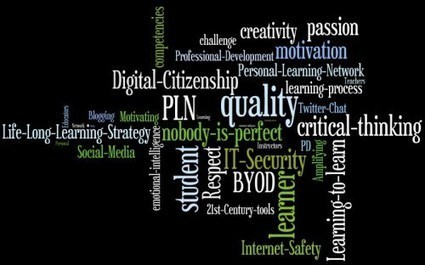


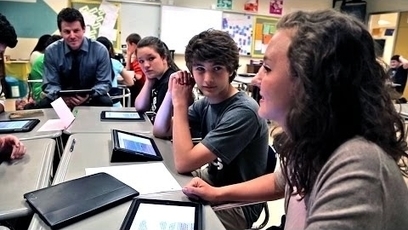
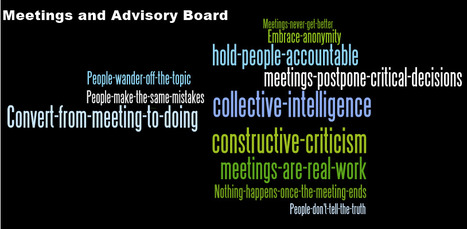


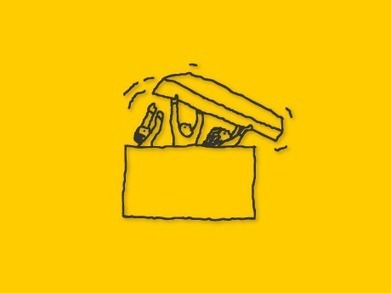
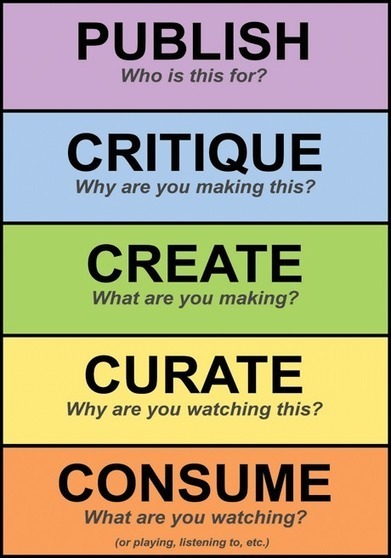



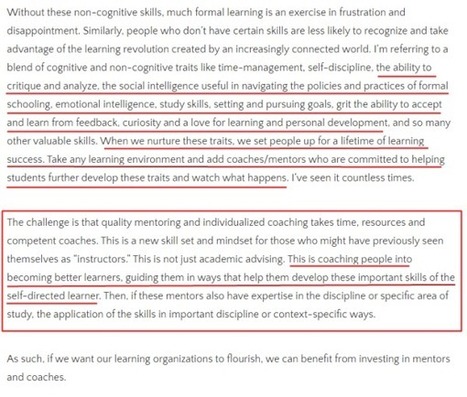
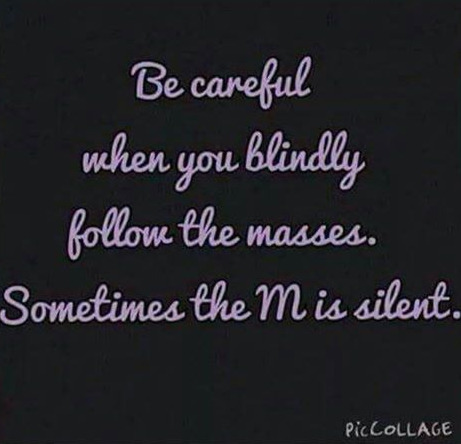













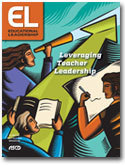



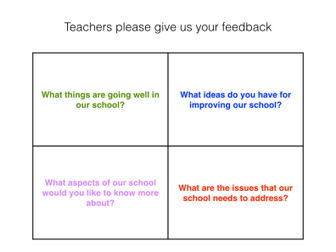
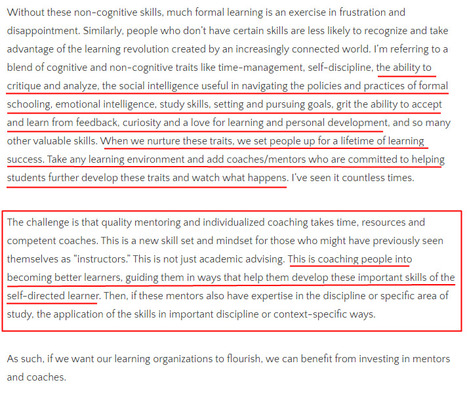

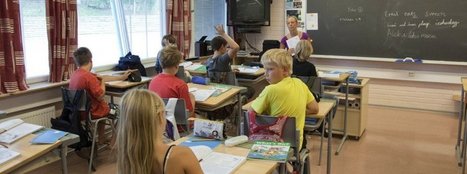





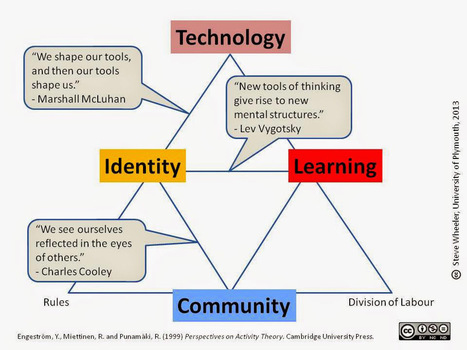







A resourceful article about Life-Long Learning. Find out more about Life-Long, Life-Wide and Life-Deep Learning @ #THES2016.
A resourceful article about Life-Long Learning. Find out more about Life-Long, Life-Wide and Life-Deep Learning @ #THES2016.